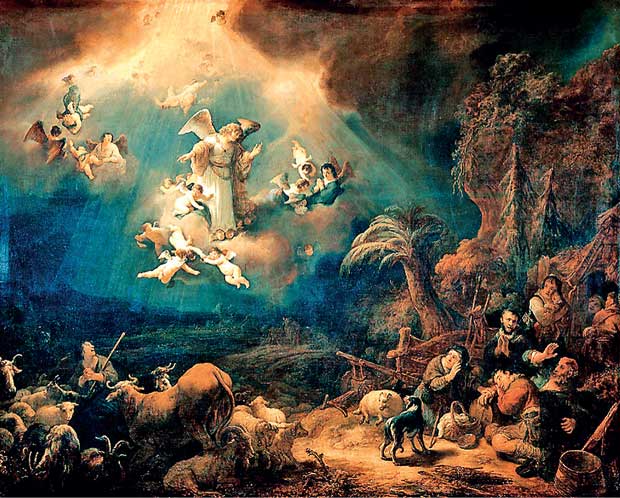Reply To:
Name - Reply Comment
Last Updated : 2024-04-16 14:43:00

The celebration of Christ’s birth on the 24th / 25th December dates back to the Third Century CE. But it is universally acknowledged that the gospels give no clue to arrive at such a date or any other date for that matter. Luke’s Gospel mentions that the shepherds were in the fields that night guarding their sheep when the birth of Christ was  announced to them. This could never have happened in the winter month of December when the freezing cold would allow neither man nor beast to spend the night in the open air. So Luke does not allow us to fix Christ’s birth in December!
announced to them. This could never have happened in the winter month of December when the freezing cold would allow neither man nor beast to spend the night in the open air. So Luke does not allow us to fix Christ’s birth in December!
Besides, the first Christians were not accustomed to celebrating birthdays. Their tradition was to treat the day of one’s death as one’s true birthday. This meaningful custom continues to this day in the church. The feast of a saint is celebrated normally on the day of that saint’s death and the Roman Martyrology introduces each saint’s feast-day (the date of death) dies natalis (birthday) of such and such a saint.
Finally, the highpoint in the festive calendar of the church had always been the Easter and not Christmas. It was at Easter that the Christians celebrated the birth of the Church as the Body of the Risen Jesus.
Historical data available to us indicate that the choice of this date as the date of Christ’s birth was the outcome of early Christianity’s critical response to the popular Roman cult of the Sun, a cult which was encouraged by Emperor Elagabalus in the early 3rd century. It was his successor, Emperor Aurelian who dedicated a temple to the “Unconquered Sun” (Sol Invictus) and fixed December 25th as the “Birth Anniversary of the Unconquered Sun” (Dies Natalis Solis Invite).
It was not historical facts but a challenge to Christian faith that made the early church adopt this same date as the birth anniversary of Christ. For, Jews and Christians were a colonized religious minority in a dominant and dominating Greco-Roman culture and they had to conserve their faith with great caution and circumspection. For them, the sun was a mere creature and never to be worshipped and their faith would not allow them to participate in that national celebration. As will be indicated below, they already had a tradition that used the metaphor of the sun to describe God, the Creator, who brings Light and Life to all Creation. How could they, in conscience, join other citizens in what they abhorred as idle-worship?
Long before the Romans began to venerate the Sun, a Jewish seer had already prophesized the coming of Christ with the words “The Sun of Justice will dawn with healing rays” (Malachi, 4:2). According to Luke’s Gospel Mary, pregnant with Jesus, arrived at her Cousin Elizabeth’s home and prophesied in song the revolutionary changes her divine Son was going to bring about. In response Zachariah (Elizabeth’s husband) also burst into song, acknowledging the arrival of Jesus as “the rising of the Sun from on high” (Lk 1:78). The Sun they welcomed and worshipped as God in Christ. They had no difficulty in honouring that SUN on the 24th/ 25th of December.
The early Christians quite soon found an ingenious way of fixing 24th/25th December as the birthday of Christ. The clue was found in the Book of James (a second-century work, not to be confused with Letter of the Apostle James); in this book, the 23rd September is mentioned as the Jewish Day of Atonement. It was allegedly on such a day or thereabouts that Zechariah entered the temple to perform his priestly sacrifice as well as received the news of his barren wife Elizabeth miraculously conceiving John the Baptist. The early Christians, therefore, added nine months to 23rd September and fixed the 24th June as the birthday of John the Baptist!
Since he was six months old when Mary conceived Jesus ---according to Angel Gabriel’s announcement--- Jesus was calculated to have been conceived on 24th / 25th March! This is the day Christians even today celebrate the Annunciation of the Birth of Jesus to Mary, i.e., the day she conceived Jesus. Add nine months to 24th/25thMarch you have December 24th/25th as the birthday of Jesus! Ingenious, indeed!
Hence the celebration of the Birth of Christ on Christmas day was a conventional agreement officially accepted by the early church rather than a historically authenticated date. While the Romans were festively engaged in Solar Worship on the 25th December, the Christians were quietly and prayerfully commemorating the birth of Christ, “the Unconquerable Sun” that was day by day conquering the hearts of gentile masses in the Roman Empire!
“Advent” was initially another way of referring to Christmas. It was much later that it assumed the meaning we give it today, namely the period of preparation for Christmas. Originally it was a synonym for Christmas. Here again, we encounter a tacit Christian contestation of what the early church saw as Imperial Rome’s idolatry.
The Latin word adventus, meaning “arrival” was originally a technical term for a new emperor’s official assumption of office. There was a custom, perhaps introduced by Augustus, that the new emperor should officially enter the City of Rome in pomp and circumstance to mark the event of his taking over imperial duties. This official arrival was referred to as the adventure (arrival). But this official entry into the City was not that of a mere human, according to the Romans. For Emperor Augustus had already claimed divinity and consequently his successor Tiberius had imprinted his title on the denarius (Roman silver coin), as Divi Filius (son of god). Hence Constantine’s official entry into Rome as the new Emperor had been recorded in a medal as adventus divi, “the Coming of the Divine One”!
Christians treated this divine claim of Roman Emperors with a sense of humour by celebrating Christmas as the real arrival or the advent of the one and only Divine Ruler that they believed in and worshipped. The critical approach they had adopted towards Rome’s sun-worship was also applied to Rome’s emperor-cult.
The aforementioned historical precedents have transformed Christmas into an event that confronts us with two contrasting value systems as well as an invitation to make an either-or choice between them. Caesar represents humans who assume divine status after acquiring political power and live on the sweat and blood of the poor masses.
God-King Jesus, by contrast, hides his divinity and joins the destitute class even at his birth to challenge the oppressive system which human rulers have created. No wonder, the very news of his birth became a threat to the local political chief, King Herod, who tried unsuccessfully to eliminate him already during infancy, a tragedy inseparably connected with Christmas. Later, the adult Jesus’ launching of the divinely willed order of justice (which he called the “Reign of God”) antagonized both politicians and the priests. Their apparently successful attempt at planning his disappearance was frustrated when they heard the news of his reappearance which consolidated his disciples into a movement, which was destined to be a perpetual challenge to the reign of Herods and the Caesars of all times!Whether the church was faithful to this mission always and everywhere is an uncomfortable and embarrassing question we must never cease to ask ourselves.
Hence our conclusion: Christmas comes as an annual reminder that the advent of Jesus, the King of Righteousness takes place today only where we Christians succeed in evoking his image and his presence by engaging in the non-violent struggle for peace and justice which characterized his earthly mission. The hope of such an advent of Christ, if kindled in our hearts and realized through our deeds, would make the celebration of this holy season a genuinely Christ-ful Christmas.

Add comment
Comments will be edited (grammar, spelling and slang) and authorized at the discretion of Daily Mirror online. The website also has the right not to publish selected comments.
Reply To:
Name - Reply Comment
On March 26, a couple arriving from Thailand was arrested with 88 live animal
According to villagers from Naula-Moragolla out of 105 families 80 can afford
Is the situation in Sri Lanka so grim that locals harbour hope that they coul
A recent post on social media revealed that three purple-faced langurs near t
09 Apr 2024 - 1 - 1167

10 Apr 2024
09 Apr 2024